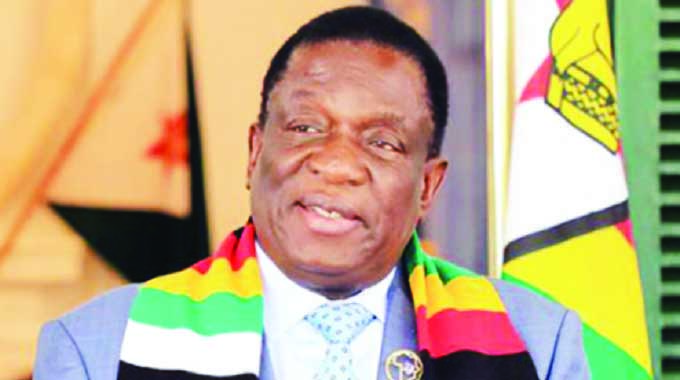ZANU PF: Intolerant of political violence, corruption

Gibson Nyikadzino
Correspondent
A choice is being given to political leaders in Zanu PF and also Government, to either pursue tranquillity or turbulence. The path to turbulence today will never be a wise one. It is a cul-de-sac.
Concrete-minded political leaders who have traditionally shown an inclination towards violence as a means to attain political power are failing to appreciate the nature of the political landscape that is panning out under the leadership of President Mnangagwa.
There is need to quit the trajectory to violence cold turkey.
Last year in an interview to mark Zimbabwe’s 41st independence anniversary celebrations, the anchors tried to draw the President to share the experiences of his detention at the hands of the Rhodesian regime. What he went through is known.
It was gruesome torture, a violation of his humanity and rights. It was an inhumane enterprise.
The President’s response was brief and clear, that he does not want to talk about such experiences because they bring very sad and teary memories.
Violence executed at political level has dangerous consequences that could make efforts of party integration, national reconciliation and regional projection hard for the Zimbabwe brand.
The condemnation of violence shows how renewed political contests should be about; a preference of ideas over brawn.
Peace within the party is a microcosm of the macrocosm. The recent relief from office of former State Security minister Owen Ncube over allegations of instigating political violence at a party meeting opens new leads in understanding undercurrents in ZANU PF, the Government and the nation at large.
Political violence is to be condemned because it shows the weakness of the ideas of one leader and that his views are no longer tenable. Political violence is not courage, but a frailty. No one should be forced, coerced and intimidated to accept a view they are not amenable to and while some believe that physical force attracts as many as it repeals, in the New Dispensation the latter is not a priority.
Expunging Hitlerism
History is replete with how distasteful political violence is. The most mentioned man who used violence for political goals is Germany’s Adolf Hitler.
He executed this violence by manipulating the youth, putting them into regiments of the Gestapo and the Storm Troopers or Brown Shirts.
Under Hitler, the SS became instruments of political intimidation who were subordinate to him and that doctrine became known as Hitlerism.
In his words, Hitler said: “I also came to understand that violence and intimidation have their significance for the masses as well as the individual.”
Politicians stand to benefit through violence. There is an old political saying that “older men declare war, but it is the youth that must fight and die”.
The burden to rebuild a nation in any country that goes through a violent transition is always inherited by the youth.
Zimbabwe is one country that has a vibrant youth demography and Zanu PF since November 2017 has captured this demography to contribute positively to the political dimensions of the party and country.
In the Second Republic, the youth have been co-opted into roles as either party or Government officials and Zanu PF has not been hesitant to excuse those that believe in violence as that has a detriment on the country’s “Open for Business” policy.
Zanu PF has deliberately advanced a position to integrate the youth in order to rehabilitate them from social ills and also make them the fort of the party that courts others to shun misdeeds.
Rebranding through
Democratisation
In the previous life of Zanu PF before the ascension of President Mnangagwa, reports of stifled democracy and guided democracy were filling to the brim hence becoming the norm.
Some leaders were not subjected to the rigorous test of what a democracy entails. The democratic space under President Mnangagwa has been opened, widened and enlarged.
Previously, political polarisation entrenched hatred and dislike of political ideas despite how moderate they were.
Vocabulary was politicised along the lines of traitor versus patriot, the pious versus the profane and the democrat versus the autocrat.
The language of political reform by the Zanu-PF party today is not only internal but national as premised on the desire to see a party and nation that is not divided along political affiliation, but where people hold each other in high esteem as equal citizens.
The expression of peace during the Zanu PF provincial and primary elections ahead of the March 26 by-elections has been a key component in the message.
The outcome of the elections have shown a revolution that is ever-rising and rebranding itself through an internal democratic process. In any elections, democracy must be defeated with the weapons of democracy.
Characteristic of the peace in the internal party elections is an expected outcome that is also expected in next year’s general elections.
Votes are defended using avenues of democracy which consist of abounding energy and the fertility of ideas and not through violence. Zanu PF has been quick to adopt to all available means for winning the support of the people through peaceful co-existence enshrined in democratic values.
Exposing Detractors
For a long time, the USA government and her western allies have used propaganda and informational chaos to demonise Zanu PF as a violent ensemble through global media corporations. The beginning of the MDC in 1999 was a sponsored initiative in which its late leader, Morgan Tsvangirai, showed a penchant for violence to unconstitutionally take over power with the help of the USA and her allies.
The MDC has been supportive of everything that is detrimental to the existing order of peace, security and democracy.
It was Tsvangirai who favoured the perpetuation and promotion of catastrophic policies through saying: “What we want to tell Mugabe is, if you do not go peacefully, we will remove you violently.” Another reminder is that when the MDC was formed by the West, it had as part of its strategy at the table to use weapons of war and warlordism in its quest to take over power. These have been the methods of the MDC, incitement, violence and intimidation.
Not only has the West been exposed by the MDC, even so, civic society has witnessed the violence ratcheted by the opposition party since 1999. More so, some civil society leaders have been victims of the wrath of the opposition’s violence as most of what they are determined with is getting funding to pursue personal agenda in the “aid industry”.
This inclination towards violence by the opposition sought and still seeks to contaminate the national ethos of the state foundations. An avalanche of social and political movements like #Tajamuka and #ThisFlag have therefore dwindled because of the absence of proof to indict Zanu-PF at the behest of their funders from the west. Above all, people who use violence in this era are invincibly tactless and inherently have a bad error of judgement.
Stronger Together
President Mnangagwa is determined to keep the country’s peace and security knitted and stitched together. He has shown that violence cannot be tolerated in both the party’s internal democracy and the nation at large and is keeping true to that promise.
Ahead of the March 26 by-elections, the absence of violence in these elections should set the tone for Zanu PF and the nation on the commitment the new Dispensation has towards peace and non-violence.
If fights are to happen, let them be ideological contests for that is what political victories are based on. The political environment in the March 26 by-elections will be a test for the 2023 general elections and the principle Zanu PF under the Second Republic is standing on is that for party leader to go to the masses to prepare the people for a violence-free plebiscite.
The revolutionary party must avoid everything that can lessen or weaken its power of influencing the masses.
Never to fall into the trappings and baits of the opposition’s predisposition to start violence in the name of “defending the vote” with violence.
It should also be evident that while others manipulate youths and send them on violent excursions, to Zanu PF, the youth quota resembles a bedrock for the development of the party and country.
No great idea can be realised in practice without the effective power that resides in the people.
For Zanu PF, it is in the masses that its power resides as it has been custom that with the people, the party is stronger.










Comments